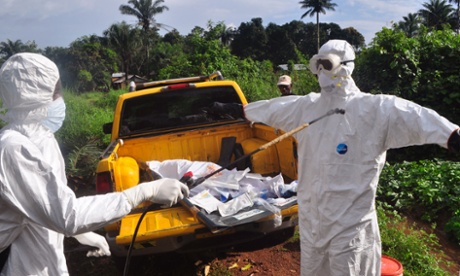Government’s visa clampdown for people from Ebola-affected countries of secondary concern to grief-stricken community, advocates say

The Australian government’s measures to restrict visas for people from Ebola-affected countries are of secondary concern to expatriate west Africans reeling from the deaths of relatives, according to community advocates in Queensland.
Joyce Taylor, a Liberian-born staffer at the independent migrant settlement organisation Multicultural Development Association (MDA), told Guardian Australia one compatriot who lives in Brisbane had lost 10 relatives to the disease.
She said the man was one of “quite a few” in the tight-knit community who had lost family to the epidemic, which has taken almost 5,000 lives, mostly in Liberia, Sierra Leone and Guinea.
“Some of them are not talking about it and we’re not pushing them either,” she said. “We need to give them their privacy and let them grieve in their way.”
The president of the Liberian Association of Queensland, Francis Davis, said the welfare of people visiting family in Liberia was also a “huge concern”.
Davis said the association was aware of a number of Queensland residents in that situation but did not have definitive numbers.
They would now be forced to undergo a 21-day quarantine period before being allowed to re-enter Australia under measures revealed by the immigration minister, Scott Morrison, on Monday.
Morrison also suspended Australia’s humanitarian visa program in Ebola-affected countries, a move attacked by the Greens as “miserly, selfish and cruel”.
On Sunday Queensland health officials said they had isolated a Guinea woman for Ebola testing in a Brisbane hospital.
The woman, 18, had arrived this month under the refugee program with one of four families from west Africa, all of whom agreed beforehand to submit to home quarantine for 21 days.
The teenager, who had a mild fever last week but tested negative to Ebola on Monday, was due to undergo a second test on Wednesday.
The Greens immigration spokeswoman, Sarah Hanson-Young, compared the government’s move to block west African refugee arrivals to “shuttering up the windows while a house burns down”.
Morrison said the systems were in place to protect Australians.
Taylor said the grief and stress of those whose families were caught up in the crisis was foremost in the minds of expatriate Liberians. It eclipsed any concerns they might have about delays to new refugee arrivals or whether Australia should send government health workers to west Africa, she said.
“It’s quite overwhelming at the moment for all of us,” she said. “If you actually talk to anyone at the moment in our community, they just don’t want to deal with anything at the moment.
“People are just not in the right space for anything, they’re just trying to support one another, that’s what’s happening.
“Right now I’m not sure people are really worried about their families coming [on humanitarian or family reunion visas]. They’re more worried about how they’re surviving back there, how they’re coping with the current situation.
“I don’t think people are worried about, ‘Are they coming or not?’ It’s, ‘Are they going to survive?’ ”
Queensland’s chief health officer, Jeannette Young, said on Monday she was aware of 18,000 people who had been screened before leaving Liberia, Sierra Leone and Guinea.
“So there’s a very thorough process which is happening at that end,” Young said.
“But you’ve got to remember it takes a long time to get from west Africa to Brisbane, it’s a lengthy flight so people can develop symptoms en route, which is why they’re checked at this end as well.”
The west African communities of Brisbane are small but growing fast. The 2011 census found the city had 376 residents born in Sierra Leone, 112 from Guinea and 453 from Liberia.
Davis said he believed there were now about 1,500 Liberian expatriates.
